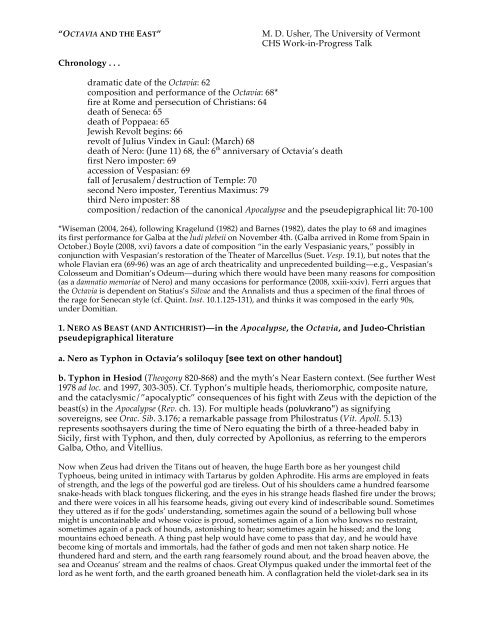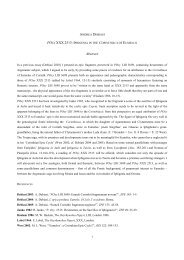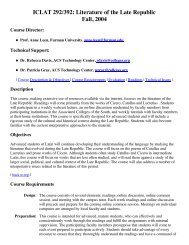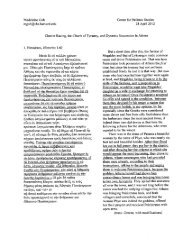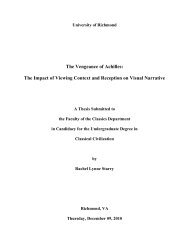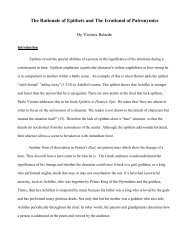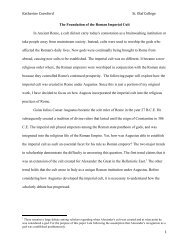M. D. Usher, The University of Vermont CHS Work-in-Progress Talk ...
M. D. Usher, The University of Vermont CHS Work-in-Progress Talk ...
M. D. Usher, The University of Vermont CHS Work-in-Progress Talk ...
Create successful ePaper yourself
Turn your PDF publications into a flip-book with our unique Google optimized e-Paper software.
“OCTAVIA AND THE EAST”<br />
M. D. <strong>Usher</strong>, <strong>The</strong> <strong>University</strong> <strong>of</strong> <strong>Vermont</strong><br />
<strong>CHS</strong> <strong>Work</strong>-<strong>in</strong>-<strong>Progress</strong> <strong>Talk</strong><br />
Chronology . . .<br />
dramatic date <strong>of</strong> the Octavia: 62<br />
composition and performance <strong>of</strong> the Octavia: 68*<br />
fire at Rome and persecution <strong>of</strong> Christians: 64<br />
death <strong>of</strong> Seneca: 65<br />
death <strong>of</strong> Poppaea: 65<br />
Jewish Revolt beg<strong>in</strong>s: 66<br />
revolt <strong>of</strong> Julius V<strong>in</strong>dex <strong>in</strong> Gaul: (March) 68<br />
death <strong>of</strong> Nero: (June 11) 68, the 6 th anniversary <strong>of</strong> Octavia’s death<br />
first Nero imposter: 69<br />
accession <strong>of</strong> Vespasian: 69<br />
fall <strong>of</strong> Jerusalem/destruction <strong>of</strong> Temple: 70<br />
second Nero imposter, Terentius Maximus: 79<br />
third Nero imposter: 88<br />
composition/redaction <strong>of</strong> the canonical Apocalypse and the pseudepigraphical lit: 70-100<br />
*Wiseman (2004, 264), follow<strong>in</strong>g Kragelund (1982) and Barnes (1982), dates the play to 68 and imag<strong>in</strong>es<br />
its first performance for Galba at the ludi plebeii on November 4th. (Galba arrived <strong>in</strong> Rome from Spa<strong>in</strong> <strong>in</strong><br />
October.) Boyle (2008, xvi) favors a date <strong>of</strong> composition “<strong>in</strong> the early Vespasianic years,” possibly <strong>in</strong><br />
conjunction with Vespasian’s restoration <strong>of</strong> the <strong>The</strong>ater <strong>of</strong> Marcellus (Suet. Vesp. 19.1), but notes that the<br />
whole Flavian era (69-96) was an age <strong>of</strong> arch theatricality and unprecedented build<strong>in</strong>g—e.g., Vespasian’s<br />
Colosseum and Domitian’s Odeum—dur<strong>in</strong>g which there would have been many reasons for composition<br />
(as a damnatio memoriae <strong>of</strong> Nero) and many occasions for performance (2008, xxiii-xxiv). Ferri argues that<br />
the Octavia is dependent on Statius’s Silvae and the Annalists and thus a specimen <strong>of</strong> the f<strong>in</strong>al throes <strong>of</strong><br />
the rage for Senecan style (cf. Qu<strong>in</strong>t. Inst. 10.1.125-131), and th<strong>in</strong>ks it was composed <strong>in</strong> the early 90s,<br />
under Domitian.<br />
1. NERO AS BEAST (AND ANTICHRIST)—<strong>in</strong> the Apocalypse, the Octavia, and Judeo-Christian<br />
pseudepigraphical literature<br />
a. Nero as Typhon <strong>in</strong> Octavia’s soliloquy [see text on other handout]<br />
b. Typhon <strong>in</strong> Hesiod (<strong>The</strong>ogony 820-868) and the myth’s Near Eastern context. (See further West<br />
1978 ad loc. and 1997, 303-305). Cf. Typhon’s multiple heads, theriomorphic, composite nature,<br />
and the cataclysmic/”apocalyptic” consequences <strong>of</strong> his fight with Zeus with the depiction <strong>of</strong> the<br />
beast(s) <strong>in</strong> the Apocalypse (Rev. ch. 13). For multiple heads (poluvkrano") as signify<strong>in</strong>g<br />
sovereigns, see Orac. Sib. 3.176; a remarkable passage from Philostratus (Vit. Apoll. 5.13)<br />
represents soothsayers dur<strong>in</strong>g the time <strong>of</strong> Nero equat<strong>in</strong>g the birth <strong>of</strong> a three-headed baby <strong>in</strong><br />
Sicily, first with Typhon, and then, duly corrected by Apollonius, as referr<strong>in</strong>g to the emperors<br />
Galba, Otho, and Vitellius.<br />
Now when Zeus had driven the Titans out <strong>of</strong> heaven, the huge Earth bore as her youngest child<br />
Typhoeus, be<strong>in</strong>g united <strong>in</strong> <strong>in</strong>timacy with Tartarus by golden Aphrodite. His arms are employed <strong>in</strong> feats<br />
<strong>of</strong> strength, and the legs <strong>of</strong> the powerful god are tireless. Out <strong>of</strong> his shoulders came a hundred fearsome<br />
snake-heads with black tongues flicker<strong>in</strong>g, and the eyes <strong>in</strong> his strange heads flashed fire under the brows;<br />
and there were voices <strong>in</strong> all his fearsome heads, giv<strong>in</strong>g out every k<strong>in</strong>d <strong>of</strong> <strong>in</strong>describable sound. Sometimes<br />
they uttered as if for the gods’ understand<strong>in</strong>g, sometimes aga<strong>in</strong> the sound <strong>of</strong> a bellow<strong>in</strong>g bull whose<br />
might is unconta<strong>in</strong>able and whose voice is proud, sometimes aga<strong>in</strong> <strong>of</strong> a lion who knows no restra<strong>in</strong>t,<br />
sometimes aga<strong>in</strong> <strong>of</strong> a pack <strong>of</strong> hounds, astonish<strong>in</strong>g to hear; sometimes aga<strong>in</strong> he hissed; and the long<br />
mounta<strong>in</strong>s echoed beneath. A th<strong>in</strong>g past help would have come to pass that day, and he would have<br />
become k<strong>in</strong>g <strong>of</strong> mortals and immortals, had the father <strong>of</strong> gods and men not taken sharp notice. He<br />
thundered hard and stern, and the earth rang fearsomely round about, and the broad heaven above, the<br />
sea and Oceanus’ stream and the realms <strong>of</strong> chaos. Great Olympus quaked under the immortal feet <strong>of</strong> the<br />
lord as he went forth, and the earth groaned beneath him. A conflagration held the violet-dark sea <strong>in</strong> its
grip, both from the thunder and light<strong>in</strong>g and from the fire <strong>of</strong> the monster, from the tornado w<strong>in</strong>ds and<br />
the flam<strong>in</strong>g bolt. All the land was seeth<strong>in</strong>g, and sky, and sea; long waves raged to and fro about the<br />
headlands from the onrush <strong>of</strong> the immortals, and an uncontrollable quak<strong>in</strong>g arose. Hades was trembl<strong>in</strong>g,<br />
lord <strong>of</strong> the dead below, and so were the Titans down <strong>in</strong> Tartarus with Kronos <strong>in</strong> their midst, at the<br />
<strong>in</strong>cessant clamor and the fearful fight<strong>in</strong>g.<br />
When Zeus had accumulated his strength, then, and taken his weapons, the thunder, lightn<strong>in</strong>g,<br />
and smok<strong>in</strong>g bolt, he leapt from Olympus and struck, and he scorched all the strange heads <strong>of</strong> the<br />
dreadful monster on every side. When he had overcome him by belabor<strong>in</strong>g him with his blows,<br />
Typhoeus collapsed crippled, and the huge earth groaned. Flames shot from the thunderstruck lord<br />
where he was smitten down, <strong>in</strong> the mounta<strong>in</strong> glens <strong>of</strong> rugged Aidna. <strong>The</strong> huge earth burned far and wide<br />
with unbelievable heat, melt<strong>in</strong>g like t<strong>in</strong> that is heated by the skill <strong>of</strong> craftsmen <strong>in</strong> crucibles with bellowholes,<br />
or as iron, which is the strongest substance, when it is overpowered by burn<strong>in</strong>g fire <strong>in</strong> mounta<strong>in</strong><br />
glens, melts <strong>in</strong> the div<strong>in</strong>e ground by Hephaestus’ craft: even so was the earth melt<strong>in</strong>g <strong>in</strong> the glare <strong>of</strong> the<br />
conflagration. And vexed at heart Zeus flung Typhoeus <strong>in</strong>to broad Tartarus. (trans. M. L. West)<br />
c. Typhon <strong>in</strong> Ovid<br />
Ovid, Met. 5.315-331: Typhoeus “casts the gods from their thrones,” chas<strong>in</strong>g them to Egypt<br />
where they hide as theriomorphs. Ovid is dependent here on Nicander’s lost Heteroeumena,<br />
paraphrased <strong>in</strong> Anton<strong>in</strong>us Liberalis. (Passage below taken from the s<strong>in</strong>g<strong>in</strong>g contest between the<br />
Muses and the Pierids.)<br />
bella canit superum falsoque <strong>in</strong> honore Gigantas<br />
320 ponit et extenuat magnorum facta deorum,<br />
emissumque ima de sede Typhoea terrae<br />
caelitibus fecisse metum cunctosque dedisse<br />
terga fugae, donec fessos Aegyptia tellus<br />
ceperit et septem discretus <strong>in</strong> ostia Nilus.<br />
325 huc quoque terrigenam venisse Typhoea narrat<br />
et se mentitis superos celasse figuris<br />
“dux” que “gregis” dixit “fit Iuppiter, unde recurvis<br />
nunc quoque formatus Libys est cum cornibus Ammon;<br />
Delius <strong>in</strong> corvo est, proles Semeleia capro,<br />
330 fele soror Phoebi, nivea Saturnia vacca,<br />
pisce Venus latuit, Cyllenius ibidis alis.”<br />
She sang <strong>of</strong> the battle <strong>of</strong> the gods and giants, ascrib<strong>in</strong>g undeserved honour to the giants and belittl<strong>in</strong>g the<br />
deeds <strong>of</strong> the mighty gods: how Typhoeus, let loose from the lowest abode <strong>of</strong> the earth, terrified the<br />
heavenly gods, and how they all turned their backs and fled, until, weary, they found refuge <strong>in</strong> the land<br />
<strong>of</strong> Egypt and the seven-mouthed Nile. How even there Typhoeus, son <strong>of</strong> the earth, pursued them, and the<br />
gods hid themselves <strong>in</strong> ly<strong>in</strong>g shapes. “Jove thus became a ram,” said she, etc. [Apollo becomes a crow,<br />
Bacchus a goat, Diana a cat, Juno a cow, Venus a fish, Mercury an ibis] (trans. Miller, rev. Goold, adapted)<br />
d. Nero as Beast onstage*; cf. Suet. Nero 29.1:<br />
Suam quidem pudicitiam usque adeo prostituit, ut contam<strong>in</strong>atis paene omnibus membris<br />
novissime quasi genus lusus excogitaret, quo ferae pelle contectus [cf. Tac. Ann. 15.44.6 ferarum<br />
tergis contecti], emitteretur e cavea virorumque ac fem<strong>in</strong>arum ad stipitem deligatorum <strong>in</strong>gu<strong>in</strong>al<br />
<strong>in</strong>vaderet et, cum affatim desaevisset, conficeretur a Doryphoro liberto.<br />
He so prostituted his own chastity that after defil<strong>in</strong>g almost every part <strong>of</strong> his body, he at last devised a<br />
k<strong>in</strong>d <strong>of</strong> game, <strong>in</strong> which, covered with the sk<strong>in</strong> <strong>of</strong> some wild animal, he was let loose from a cage and<br />
attacked the private parts <strong>of</strong> men and women, who were bound to stakes, and when he had sated his mad<br />
lust, was f<strong>in</strong>ished <strong>of</strong>f by his freedman Doryphorus. (trans. J. C. Rolfe)<br />
*Bradley (1978, 164) suggests this passage is “an embellishment <strong>of</strong> one <strong>of</strong> the punishments<br />
suffered by the Christians <strong>in</strong> 64”; cf. Heb. 10:33, where the author refers to Christians be<strong>in</strong>g<br />
persecuted and made a spectacle <strong>of</strong> <strong>in</strong> the theaters (qeatrizovmenoi).
e. Nero as Belial/Beliar <strong>in</strong> Pseudepigraphical Literature<br />
“for the angel <strong>of</strong> <strong>in</strong>iquity who rules this world is Beliar . . .” (Ascension <strong>of</strong> Isaiah 2.4)<br />
Martyrdom and Ascension <strong>of</strong> Isaiah 4.1-13 (<strong>The</strong> Reign <strong>of</strong> Beliar)<br />
1 Now, therefore, Hezekiah and Josab my son, [these are the days <strong>of</strong> the<br />
2 completion <strong>of</strong> the world]. And after it has been brought to completion, Beliar<br />
will descend, the great angel, the k<strong>in</strong>g <strong>of</strong> this world, which he has ruled ever<br />
s<strong>in</strong>ce it existed. He will descend from his firmament <strong>in</strong> the form <strong>of</strong> a man, a k<strong>in</strong>g<br />
3 <strong>of</strong> <strong>in</strong>iquity, a murderer <strong>of</strong> his mother—this is the k<strong>in</strong>g <strong>of</strong> this world—and will<br />
persecute the plant which the twelve apostles <strong>of</strong> the Beloved will have planted;<br />
4 some <strong>of</strong> the twelve will be given <strong>in</strong>to his hand. This angel, Beliar, will come<br />
<strong>in</strong> the form <strong>of</strong> that k<strong>in</strong>g, and with him will come all the powers <strong>of</strong> this world,<br />
5 and they will obey him <strong>in</strong> every wish. By his word he will cause the sun to rise<br />
6 by night, and the moon also he will make to appear at the sixth hour. And he<br />
will do everyth<strong>in</strong>g he wishes <strong>in</strong> the world; he will act and speak like the Beloved,<br />
7 and will say, “I am the LORD, and before me there was no one.” And all men<br />
8 <strong>in</strong> the world will believe <strong>in</strong> him. <strong>The</strong>y will sacrifice to him and will serve him,<br />
9 say<strong>in</strong>g, “This is the LORD, and besides him there is no other.” And the majority<br />
<strong>of</strong> those who have associated together to receive the Beloved he will turn aside<br />
10,11 after him. And the power <strong>of</strong> his miracles will be <strong>in</strong> every city and district, and<br />
12 he will set up his image before him <strong>in</strong> every city. And he will rule for three<br />
13 years and seven months and twenty-seven days. And many faithful and sa<strong>in</strong>ts,<br />
when they saw him for whom they were hop<strong>in</strong>g, who was crucified, Jesus the<br />
LORD Christ—after I, Isaiah, had seen him who was crucified and ascended—and<br />
who believed <strong>in</strong> him, <strong>of</strong> these few will be left <strong>in</strong> those days as his servants,<br />
flee<strong>in</strong>g from desert to desert as they await his com<strong>in</strong>g.<br />
Sibyll<strong>in</strong>e Oracles 3.63-74 (<strong>The</strong> Advent <strong>of</strong> Beliar)<br />
ejk de; Sebasthnw'n e{xei Belivar metovpisqen<br />
kai; sthvsei ojrevwn u{yo", sthvsei de; qavlassan<br />
65 hjevlion puroventa mevgan lampravn te selhvnhn<br />
kai; nevkua" sthvsei kai; shvmata polla; poihvsei<br />
ajnqrwvpoi": ajll j oujci; telesfovra e[sset j ejn aujtw'/<br />
ajlla plana'/ kai; dh; mevropa", pollouv" te planhvsei<br />
pistouv" t j ejklektouv" q j JEbraivou" ajnovmou" te kai; a[llou"<br />
70 ajnevra", oi{t<strong>in</strong>e" ou[pw qeou' lovgon eijshvkousan.<br />
ajll j oJpovtan megavloio qeou' pelavsws<strong>in</strong> ajpeilaiv,<br />
kai; duvnami" flogevousa di j oi[dmato" eij" gai'an h{xh/,<br />
kai; Belivar flevxh/ kai; uJperfiavlou" ajnqrwvpou"<br />
pavnta", o{soi touvtw/ pivst<strong>in</strong> ejnipoihvsanto.<br />
<strong>The</strong>n Beliar will come from the Sebastenoi [= Lat. Augustani; i.e., Nero]<br />
and he will raise up the height <strong>of</strong> mounta<strong>in</strong>s, he will raise up the sea,<br />
65 the great fiery sun and sh<strong>in</strong><strong>in</strong>g moon,<br />
and he will raise up the dead, and perform many signs<br />
for men. But they will not be effective <strong>in</strong> him.<br />
But he will, <strong>in</strong>deed, also lead men astray, and he will lead astray<br />
many faithful, chosen Hebrews, and also other lawless men<br />
70 who have not yet listened to the word <strong>of</strong> God.<br />
But whenever the threats <strong>of</strong> the great God draws nigh<br />
and a burn<strong>in</strong>g power comes through the sea to land
it will also burn Beliar and all overbear<strong>in</strong>g men,<br />
as many as put faith <strong>in</strong> him.<br />
2. NERO AND THE MYTH OF THE AGES—<strong>in</strong> the Octavia, Hesiod, Sibyll<strong>in</strong>e Oracles and other<br />
apocalyptic literature<br />
a. Seneca’s soliloquy (Octavia l<strong>in</strong>es 377-437), where<strong>in</strong> Seneca laments the fall from the Golden<br />
Age [see other handout]<br />
b. For the Myth <strong>of</strong> the Ages cf. Hes. W&D 106-201; note the change to the future tense upon<br />
reach<strong>in</strong>g the Age <strong>of</strong> Iron at 174 ff., and note 1) the Near Eastern orig<strong>in</strong> <strong>of</strong> the myth, esp. Daniel<br />
2:31ff. (West 1978, 172-177 and 1997, 312-319), and 2) the stylistic and thematic <strong>in</strong>fluence <strong>of</strong><br />
Hesiod on the Sibyll<strong>in</strong>e Oracles <strong>in</strong> general, esp. Books 1, 2 and 3 (cf. Lightfoot 2007, 166). I note<br />
with <strong>in</strong>terest that Probus, an ancient commentator on Vergil, read the phrase Cumaeum carmen<br />
at Vergil’s Eclogue 4 (l<strong>in</strong>e 4) as a reference to Hesiod (whose family came to Ascra from Aeolian<br />
Cyme) and to his Myth <strong>of</strong> the Ages, doubtless because <strong>of</strong> the similarities between Vergil’s<br />
Sibyll<strong>in</strong>e schematization <strong>of</strong> saecula and Hesiod’s account.<br />
3. MISCELLANEOUS CONNECTIONS WITH THE EAST<br />
a. Messianic expectations <strong>in</strong> Judaea. Cf. Suet., Vesp. 4.5:<br />
Percrebruerat Oriente toto vetus et constans op<strong>in</strong>io esse <strong>in</strong> fatis ut eo tempore Iudaea pr<strong>of</strong>ecti<br />
rerum potirentur. Id de imperatore Romano, quantum postea eventu paruit, praedictum Iudaei<br />
ad se trahentes rebellarunt . . .<br />
<strong>The</strong>re had spread [note the pluperfect tense] over all the Orient an old and established belief, that it was<br />
fated at that time for men com<strong>in</strong>g from Judaea to rule the world. This prediction, referr<strong>in</strong>g to the emperor<br />
<strong>of</strong> Rome, as afterwards appeared from the event, the people <strong>of</strong> Judaea took to themselves [and]<br />
accord<strong>in</strong>gly revolted . . . (trans. J. C. Rolfe)<br />
b. All the Nero imposters came from the Eastern Empire and cavort with the Parthians . . .<br />
c. Poppaea and Jospehus . . .<br />
—Josephus meets Poppaea through Alityrus, a Jewish actor and favorite <strong>of</strong> Nero (dia; filiva"<br />
ajfikovmhn jAlituvrw/, mimolovgo" d j h'n ou{to" mavlista tw'/ Nevrwni kataquvmio", jIoudai'o"<br />
to; gevno" Jos. Life 16), <strong>in</strong> 64 while on embassy to secure the release <strong>of</strong> Jewish priests held as<br />
prisoners at Rome; elsewhere Josephus expressly calls Poppaea a “God-fearer,” qeosebhv", a<br />
technical term for a Gentile sympathetic to the Jewish religion (cf. Jos. Ant. 20.189: Poppaiva/,<br />
qeosebh;" ga;r h\n, uJpe;r tw'n jIoudaivwn dehqeivsh/).<br />
—Note, too, Josephus’s prophecy to Vespasian (Suet. Vesp. 5.6):<br />
Apud Iudaeam Carmeli dei oraculum consulentem ita confirmavere sortes, ut quidquid<br />
cogitaret volveretque animo quamlibet magnum, id esse proventurum pollicerentur; et unus ex<br />
nobilibus captivis Iosephus, cum coiceretur <strong>in</strong> v<strong>in</strong>cula, constantissime asseveravit fore ut ab<br />
eodem brevi solveretur, verum iam imperatore.<br />
When he consulted the oracle <strong>of</strong> the god <strong>of</strong> Mount Carmel <strong>in</strong> Judaea, the lots were highly encourag<strong>in</strong>g,<br />
promis<strong>in</strong>g that whatever he planned or wished, however great it might be, would come to pass; and one<br />
<strong>of</strong> the high-born prisoners, Josephus by name, as he was be<strong>in</strong>g put <strong>in</strong> cha<strong>in</strong>s, declared most confidently<br />
that he would soon be released by the same man, who would then, however, be emperor. (trans. J. C.<br />
Rolfe)
d. Nero receives a horoscope, <strong>in</strong> the wake <strong>of</strong> V<strong>in</strong>dex’s revolt <strong>in</strong> Gaul, about flee<strong>in</strong>g to the East<br />
and sett<strong>in</strong>g up a k<strong>in</strong>gdom <strong>in</strong> Jerusalem (Suet. Nero 40.2):<br />
Praedictum a mathematicis Neroni olim erat fore ut quandoque destitueretur . . . Spoponderant<br />
tamen quidam destituto Orientis dom<strong>in</strong>ationem, nonnulli nom<strong>in</strong>atim regnum<br />
Hierosolymorum, plures omnis prist<strong>in</strong>ae fortunae restitutionem.<br />
Astrologers had predicted to Nero that he would one day be left deserted . . . Some <strong>of</strong> them, however,<br />
had promised him the rule <strong>of</strong> the East, when he was cast <strong>of</strong>f, a few expressly nam<strong>in</strong>g the sovereignty <strong>of</strong><br />
Jerusalem, and several the restitution <strong>of</strong> all his former fortunes. (trans. J. C. Rolfe, adapted)<br />
NOTE: Co<strong>in</strong>s first m<strong>in</strong>ted between 5 and 14 CE <strong>in</strong> Antioch and subsequently appear<strong>in</strong>g over<br />
two centuries bear the sign <strong>of</strong> Aries. (<strong>The</strong> depiction is <strong>of</strong> a leap<strong>in</strong>g ram look<strong>in</strong>g over his<br />
shoulder at a star overhead; an image <strong>of</strong> Zeus appears on the obverse.) Accord<strong>in</strong>g to Ptolemy<br />
(Tetrabiblos 2.3, but dependent on earlier astrological lore gleaned from Poseidonius), Aries is<br />
the sign represent<strong>in</strong>g Coele Syria, Palest<strong>in</strong>e, Idumea, and Judaea. In a fasc<strong>in</strong>at<strong>in</strong>g article, Molnar<br />
(1998)—a PhD <strong>in</strong> astronomy, not a Classicist or biblical scholar—conv<strong>in</strong>c<strong>in</strong>gly reconstructs<br />
Nero’s horoscope from <strong>in</strong>structions provided by the ancient handbooks, not only confirm<strong>in</strong>g<br />
Suetonius’s report, but also shedd<strong>in</strong>g light on the Star <strong>of</strong> Bethlehem (Matt. 2:1-16), also located<br />
astrologically <strong>in</strong> Aries, which was seen as fulfillment <strong>of</strong> the prophecy <strong>of</strong> Balaam’s ass (Num.<br />
24:17) that “there shall come a Star out <strong>of</strong> Jacob, and a Sceptre shall rise out <strong>of</strong> Israel.” Nero’s<br />
horoscope, <strong>in</strong> other words, recalled/corresponded to that earlier Messianic sign.<br />
e. Suetonius’s depiction <strong>of</strong> Nero as a second Cambyses:<br />
—marries his sister Octavia (=stepsister and sister by adoption); the collocation soror et coniunx<br />
(an eastern detail <strong>in</strong> and <strong>of</strong> itself) appears 7 times <strong>in</strong> the Octavia: 46-48, 220, 284, 535, 658, 828,<br />
909-10.<br />
—kicks his pregnant wife (Poppaea) to death (Suet. Nero 35.3; Tac. Ann. 16.6.1; Dio 62.27.4)<br />
—kills his brother (Britannicus) and sister (Octavia)<br />
—madness (passim)<br />
—overthrows the traditional gods and violates the customs <strong>of</strong> his subjects (cf. Tac. Ann. 15.45;<br />
Suet. Nero 32.4 and cf. 56.1, where Nero is called religionum . . . contemptor)<br />
f. Onomastic numerology (isopsephy/gematria) applied to both Beast and Nero . . .<br />
—Suetonius says that multa Graece Lat<strong>in</strong>eque proscripta aut vulgata sunt, e.g., Suet. Nero 39.2:<br />
neovyhfon: Nevrwn ijdivan mhtevra ajpevkte<strong>in</strong>e (“a new tally: ‘Nero’— ‘he killed his own<br />
mother’” <strong>in</strong> which both the name Nero and the phrase follow<strong>in</strong>g it have a numerical value <strong>of</strong><br />
1005; see Luz 2010, 299)<br />
—“Gematria is one <strong>of</strong> the Sibyl’s trademarks” (Lightfoot 2007, 388)—cf., e.g., the riddle at Orac.<br />
Sib. 1.141-145 which produces MONOGENHS UIOS QEOU. Various forms <strong>of</strong> the same k<strong>in</strong>d <strong>of</strong><br />
onomastic riddle appear <strong>in</strong> alchemical texts and on the 2 nd or 3 rd century grave marker <strong>of</strong> one<br />
Diliporis from Nicaea (Asia M<strong>in</strong>or) (Luz 2010, 314-316).<br />
—<strong>The</strong> Number <strong>of</strong> the Beast <strong>in</strong> Revelation 13:18 . . .<br />
cx" or eJxakovsioi eJxhvkonta e{x = 666, or, <strong>in</strong> some MSS, ci" = 616<br />
Nevrwn Kai'sar <strong>in</strong> Hebrew is: rsq !wrn (nun+resh+vav+nun + koph+samek+resh) = 666
Nevrw Kai'sar (without term<strong>in</strong>al nun): rsq wrn = 616<br />
50 200 6 50 100 60 200<br />
g. A Sibyll<strong>in</strong>e oracle (re)circulat<strong>in</strong>g at Rome after the Great Fire <strong>of</strong> 64; cf. Dio 62.18.3-4:<br />
oJ mevntoi dh'mo" oujk e[st<strong>in</strong> o{ ti ouj kata; tou' Nevrwno" hjra'to, to; me;n o[noma aujtou'<br />
mh; uJpolevgwn, a[llw" de; dh; toi'" th;n povl<strong>in</strong> ejmprhvsasi katarwvmenoi, kai; mavlisq j o{ti<br />
aujtou;" hJ mnhvmh tou' logivou tou' kata; to;n Tibevriovn pote aj/sqevnto" ejqoruvbei. h\n de;<br />
tou'to<br />
tri;" de; trihkosivwn peritellomevnwn ejniautw'n<br />
JRwmaivou" e[mfulo" ojlei' stavsi", [caJ Subari'ti"<br />
ajfrosuvna . . .]<br />
ejpeidhv te oJ Nevrwn paramuqouvmeno" aujtou;" oujdamou' tau'ta ta; e[ph euJrevsqai e[lege,<br />
metabalovnte" e{teron lovgion wJ" kai; Sibuvlleion o[ntw" o]n h\/don: e[sti de; tou'to<br />
e[scato" Aijneadw'n mhtroktovno" hJgemoneuvsei<br />
kai; e[scen ou{tw", ei[te kai; wJ" ajlhqw'" qeomanteiva/ t<strong>in</strong>i; prolecqevn, ei[te kai; tovte uJpo;<br />
tou' oJmivlou pro;" ta; parovnta qeiasqevn: teletai'o" ga;r tw'n jIoulivwn tw'n ajpo; Aijneivou<br />
genomevnwn ejmonavrchse.<br />
<strong>The</strong>re was no curse that the populace did not <strong>in</strong>voke upon Nero, though they did not mention his name,<br />
but simply cursed <strong>in</strong> general terms those who had set the city on fire. And they were disturbed above all<br />
by recall<strong>in</strong>g the oracle which once <strong>in</strong> the time <strong>of</strong> Tiberius had been on everybody’s lips. It ran thus:<br />
Thrice three hundred years hav<strong>in</strong>g run their course <strong>of</strong> fulfillment<br />
Rome by the strife <strong>of</strong> her people shall perish.<br />
And when Nero, by way <strong>of</strong> encourag<strong>in</strong>g them, reported that these verses could not be found anywhere,<br />
they dropped them and proceeded to repeat another oracle, which they averred to be a genu<strong>in</strong>e Sibyll<strong>in</strong>e<br />
prophecy, namely:<br />
Last <strong>of</strong> the sons <strong>of</strong> Aeneas, a mother-slayer shall rule.<br />
And so it proved, whether this verse was actually spoken beforehand by some div<strong>in</strong>e prophecy, or the<br />
populace was now for the first time <strong>in</strong>spired, <strong>in</strong> view <strong>of</strong> the present situation, to utter it. For Nero was<br />
<strong>in</strong>deed the last emperor <strong>of</strong> the Julian l<strong>in</strong>e, the l<strong>in</strong>e descended from Aeneas. (trans. Cary)<br />
NOTE: This oracle first circulated <strong>in</strong> 19 C.E. under Tiberius (Dio 57.18.4-5) dur<strong>in</strong>g a similar time<br />
<strong>of</strong> crisis. (<strong>The</strong> phrase about Sybaritic folly above comes from that earlier passage <strong>in</strong> Dio.)<br />
Tiberius’s response was to “denounce the verses as false and make <strong>in</strong> <strong>in</strong>vestigation <strong>of</strong> all the<br />
books that conta<strong>in</strong>ed any prophecies, reject<strong>in</strong>g some as worthless and reta<strong>in</strong><strong>in</strong>g others as<br />
genu<strong>in</strong>e,” just as Augustus had once done upon becom<strong>in</strong>g Pontifex Maximus <strong>in</strong> 13 B.C.E. (cf.<br />
Suet. Aug. 31.1)<br />
Note further three th<strong>in</strong>gs: 1) the prediction <strong>of</strong> destruction (ojlei') through civil war (e[mfulo"<br />
stavsi") <strong>in</strong> the tenth saeculum (900 years), ten ages be<strong>in</strong>g the typically Roman/Etruscan and<br />
Sibyll<strong>in</strong>e scheme (Book 2 <strong>of</strong> the Orac. Sib. is organized <strong>in</strong> just this way); 2) the imputation that<br />
the end <strong>of</strong> days is caused by luxuria—“rank excess” (cf. Subari'ti"/ajfrosuvna)—at Nero’s court,<br />
which is also major theme <strong>in</strong> the Octavia (cf., e.g., 433-434: luxuria victrix orbis immensas opes / iam
pridem avaris manibus, ut perdat, rapit); note a related oracle <strong>in</strong> Athen. 12.520b, said to be Delphic,<br />
predict<strong>in</strong>g the fall <strong>of</strong> Sybaris when its citizens treated a mortal man better than a god, which<br />
conta<strong>in</strong>s the phrase e[mfulo" stavsi"; 3) the avoidance by the dh'mo" (plebs urbana) <strong>of</strong><br />
mention<strong>in</strong>g Nero by name <strong>in</strong> oracles and lampoons; <strong>in</strong> Octavia there is a studied avoidance <strong>of</strong><br />
mention<strong>in</strong>g any <strong>of</strong> the ma<strong>in</strong> characters by name (e.g., Octavia, Nero, Messal<strong>in</strong>a, Agripp<strong>in</strong>a,<br />
Acte, Poppaea), what I take to be an affectation <strong>of</strong> oracular style. One iambic lampoon on<br />
Nero—Nevrwn jOrevsth" jAlkmevwn mhtroktovno" (Suet. Nero 39.2) was actually mistaken as a<br />
Delphic oracle and attributed to the Pythia (Parke and Wormell 1956: I, 284; II, no. 597).
OCTAVIA AND THE EAST: PASSAGES FROM THE OCTAVIA<br />
1. Nero as Typhon <strong>in</strong> Octavia’s soliloquy:<br />
Iungentur ante saeva sideribus freta<br />
et ignis undae, Tartaro tristi polus,<br />
lux alma tenebris, roscidae nocti dies,<br />
225 quam cum scelesti coniugis mente impia<br />
mens nostra semper fratris ext<strong>in</strong>cti memor.<br />
ut<strong>in</strong>am nefandi pr<strong>in</strong>cipis dirum caput<br />
obruere flammis caelitum rector paret,<br />
qui saepe terras fulm<strong>in</strong>e <strong>in</strong>festo quatit<br />
230 mentesque nostras ignibus terret sacris<br />
novisque monstris. vidimus caelo iubar<br />
ardens cometam pandere <strong>in</strong>festa face<br />
qua plaustra tardus noctis aeterna vice<br />
regit Bootes, frigore Arctoo rigens.<br />
235 en ipse diro spiritu saevi ducis<br />
polluitur aether, gentibus clades novas<br />
m<strong>in</strong>antur astra, quas regit dux impius.<br />
non tam ferum Typhona neglecto Iove<br />
irata Tellus edidit quondam parens.<br />
240 hic gravior illo pestis, hic hostis deum<br />
hom<strong>in</strong>umque templis expulit superos suis<br />
civesque patria, spiritum fratri abstulit,<br />
hausit cruorem matris—et lucem vidit<br />
fruiturque vita noxiam atque animam trahit!<br />
245 pro summe genitor, tela cur frustra iacis<br />
<strong>in</strong>victa totiens temere regali manu<br />
<strong>in</strong> tam nocentem dextra cur cessat tua<br />
ut<strong>in</strong>am suorum fac<strong>in</strong>orum poenas luat<br />
Nero <strong>in</strong>sitivus, Domitio genitus patre,<br />
250 orbis tyrannus, quem premit turpi iugo<br />
morumque vitiis nomen Augustum <strong>in</strong>qu<strong>in</strong>at.<br />
adynata (but note the imagery <strong>of</strong> cataclysm) . . .<br />
“would that Jupiter strike Nero . . .”<br />
comets/lightn<strong>in</strong>g strikes (<strong>in</strong> 60 lightn<strong>in</strong>g strikes<br />
Nero’s table—Tac. Ann. 14.22; <strong>in</strong> 62 statue <strong>of</strong><br />
Nero struck—Ann. 15.22) . . .<br />
the peoples <strong>of</strong> the earth threatened further with<br />
astronomical/astrological disaster . . .<br />
Nero worse than Typhon (note his sacriligious<br />
pillag<strong>in</strong>g <strong>of</strong> temples); cf. l<strong>in</strong>e 89: spernit superos<br />
hom<strong>in</strong>esque simul . . .<br />
renewed plea for Jupiter to strike down Nero<br />
cf. l<strong>in</strong>es 371-2, where the Chorus imag<strong>in</strong>es Agripp<strong>in</strong>a say<strong>in</strong>g “Hic est, hic est<br />
fodiendus,” ait, “ferro, monstrum qui tale tulit.”<br />
2. Nero and the Myth <strong>of</strong> the Ages <strong>in</strong> Seneca’s soliloquy (note how his account<br />
culm<strong>in</strong>ates <strong>in</strong> the Iron Age with the stage entrance <strong>of</strong> Nero):<br />
Quid, impotens Fortuna, fallaci mihi<br />
blandita vultu, sorte contentum mea<br />
alte extulisti, gravius ut ruerem edita<br />
380 receptus arce totque prospicerem metus<br />
melius latebam procul ab <strong>in</strong>vidiae malis<br />
remotus <strong>in</strong>ter Corsici rupes maris<br />
ubi liber animus et sui iuris mihi<br />
semper vacabat studia recolenti mea.<br />
“How the mighty have fallen”—Seneca the chastened<br />
philosopher . . .<br />
Seneca wishes he were <strong>in</strong> exile aga<strong>in</strong> (i.e., had never<br />
been recalled) . . .
385 o quam iuvabat, quo nihil maius parens<br />
natura genuit, operis immensi artifex,<br />
caelum <strong>in</strong>tueri solis et currus sacros<br />
mundique motus, noctis alternas vices<br />
orbemque Phoebes, astra quem c<strong>in</strong>gunt vaga,<br />
390 lateque fulgens aetheris magni decus.<br />
qui si senescit tantus <strong>in</strong> caecum chaos<br />
casurus iterum, nunc adest mundo dies<br />
supremus ille qui premat genus impium<br />
caeli ru<strong>in</strong>a, rursus ut stirpem novam<br />
395 generet renascens melior, ut quondam tulit<br />
iuvenis tenente regna Saturno poli!<br />
tunc illa virgo, num<strong>in</strong>is magni dea,<br />
Iustitia, caelo missa cum sancta Fide<br />
terris regebat mitis humanum genus.<br />
400 non bella norant, non tubae fremitus truces,<br />
non arma gentes, c<strong>in</strong>gere assuerant suas<br />
muris nec urbes; pervium cunctis iter,<br />
communis usus omnium rerum fuit;<br />
et ipsa Tellus laeta fecundos s<strong>in</strong>us<br />
405 pandebat ultro, tam piis felix parens<br />
et tuta alumnis.<br />
alia sed suboles m<strong>in</strong>us<br />
conspecta mitis, tertium sollers genus<br />
novas ad artes extitit, sanctum tamen.<br />
mox <strong>in</strong>quietum, quod sequi cursu feras<br />
410 auderet acres, fluctibus tectos gravi<br />
extrahere pisces rete vel calamo levi,<br />
decipere volucres crate vel <br />
tenere laqueo, premere subiectos iugo<br />
tauros feroces, vulnere immunem prius<br />
415 sulcare terram, laesa quae fruges suas<br />
<strong>in</strong>terius alte condidit sacro s<strong>in</strong>u.<br />
sed <strong>in</strong> parentis viscera <strong>in</strong>travit suae<br />
deterior aetas, eruit ferrum grave<br />
aurumque, saevas mox et armavit manus.<br />
420 partita f<strong>in</strong>es regna constituit, novas<br />
extruxit urbes, tecta defendit sua<br />
aliena telis aut petit praedae imm<strong>in</strong>ens.<br />
neglecta terras fugit et mores feros<br />
hom<strong>in</strong>um et cruenta caede pollutas manus<br />
425 Astraea virgo, siderum magnum decus.<br />
cupido belli crevit atque auri fames<br />
totum per orbem, maximum exortum est malum<br />
luxuria, pestis blanda, cui vires dedit<br />
roburque longum tempus atque error gravis.<br />
430 collecta vitia per tot aetates diu<br />
<strong>in</strong> nos redundant; saeculo premimur gravi<br />
quo scelera regnant, saevit impietas furens,<br />
turpi libido Venere dom<strong>in</strong>atur potens<br />
luxuria victrix orbis immensas opes<br />
435 iam pridem avaris manibus, ut perdat, rapit.<br />
sed ecce gressu fertur attonito Nero<br />
trucique vultu: quid ferat mente horreo.<br />
Seneca longs to contemplate the providential<br />
work<strong>in</strong>gs <strong>of</strong> Nature . . .<br />
“apocalyptic” cataclysm envisioned; New<br />
Age announced . . .<br />
Golden/Saturnian Age described . . .<br />
-note personifications (Justice and Trust<br />
prevail)<br />
-no war<br />
-safe passage<br />
-all th<strong>in</strong>gs <strong>in</strong> common<br />
2 nd Race and 3 rd . . . from hunter-gatherers<br />
to agriculturalists (note the aggressive acts<br />
and language <strong>of</strong> violence used here) . . .<br />
4th Age (deterior aetas); Astraea/Justice’s<br />
flight from earth . . .<br />
<strong>in</strong>trat Nero! (first time by name <strong>in</strong> play)


